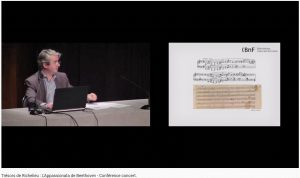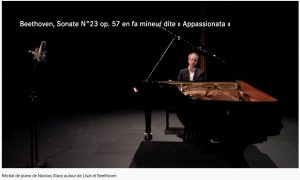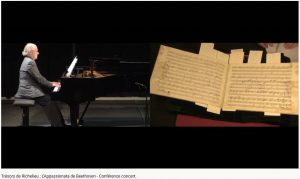As is the case with most national libraries, the Bibliothèque nationale de France (BnF) engages in a range of activities including – but not limited to – legal deposit, reference collections and services both for researchers and academics (research library) and the general public (public library) and national and international cooperation. Such activities are legally assigned to BnF by a government decree. As part of what is called “valorization” are a number of outreach activities such as exhibitions, but also conferences, lectures, concerts and other shows, educational programs, etc.
As an academic and research entity of BnF, the Music department contributes regularly to such programs, in the framework of a “cultural agenda” driven by periodic (such as the European heritage days or the yearly BnF Festival), current or exceptional events (large acquisitions, scientific symposiums, etc.).
For example, in 2020 we celebrated the “250th birthday” of Ludwig van Beethoven (1770-1827) and as BnF’s Music department holds several original manuscripts of the composer we planned two public piano concerts related to such rare artifacts, that were to be held in the Spring:
– One with Nicolas Stavy for a program combining a Beethoven piano sonata, the “Appassionata” (N°23, opus N° 57, part of our collections), and several Liszt pieces, including the “From Cradle to Grave” one (also part of our collections)
– One with Alain Planès, for a dual bill conference and concert about and with the “Appassionata”.
Owing to the pandemic we had to postpone them because of the lockdown in France between March and June 2020, which saw the closure of all public venues. When the situation went back to a “new normal” we rescheduled the concerts for the Fall season; but then in November, France went through a second lockdown. Although this second lockdown was less stringent than the previous one (most BnF reading rooms stayed open, for instance, albeit with specific sanitary measures), while theaters, cinemas, auditoriums etc. remained closed.
At this stage, the institution had to decide either to cancel the events for good, or to find another way to produce them. The choice was not easy: (a) we had no visibility to plan for future dates given the uncertain evolution of the pandemic (b) because of the anniversary nature of the events, it did not make much sense to schedule them in 2021 or later (c) we had booked well-known artist on premises – public performances – that were no longer valid.
Therefore we discussed the options with the artists and proposed to organize online performances. This resulted in three programs:
– A documentary on the Beethoven and Lizst manuscripts, with Nicolas Stavy, that was shot in November and put online thereafter to serve as a teaser for the events;
– The Nicolas Stavy concert, with a brief introduction, that was then recorded, slightly post-produced, and broadcast on 3 December, then put online;
– The “Appassionata” conference and concert, that was broadcast live on 15 December (approximate date of birth of Beethoven) on Facebook then put online on YouTube.
Beyond my personal involvement in these projects and beyond BnF music’s department, I think these experiences provide food for thought, for outreach activities of academic & research libraries working with heritage collections:
- The positive feedback of the events (with a larger number of “views” than the physical capacity of auditoriums) shows the attractiveness of heritage concerts where high standards of quality content and production are met;
- Both for library curators, artists involved, and the general public, nothing can replace live on-site performances, and to a certain extent, there would be a danger to permanently move such events online;
- These experiences therefore, if repeated in the future, are to be viewed not as a worst-case-scenario, but as an alternate and complementary experience to the live performances that artists, librarians and the public are still looking for, longing for – and want to see and hear!
The dialogue between heritage documents and public performances is evolving; it provides opportunities to reinvent the content created by research librarians. This is good news, but in the same way that remote content enriched BnF’s services during the pandemic without replacing our reading rooms – which are currently open – this shift does not equate to giving up future public performances. The music is on, and the venue just more diverse and we hope, it brings as much knowledge and fun as ever to our various audiences.
Jérôme FRONTY
Bibliothèque nationale de France, Music department
jerome.fronty@bnf.fr


